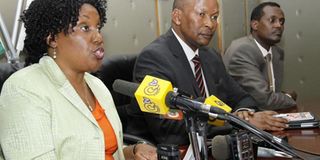Weeks later, no Matemu replacement

Former Ethics and Anti-Corruption Commission chairperson Mumo Matemu (centre) and former vice chairperson Irene Keino during a press briefing in the past. PHOTO | FILE |
What you need to know:
- The 14-day period lapsed last week, and State House has not initiated the process.
- Mr Matemu resigned on May 12 just days after Ms Keino had tendered her resignation.
Concern is mounting over President Uhuru Kenyatta’s failure to appoint a selection panel to recruit new commissioners of the anti-graft body during the legally proscribed period.
The 14-day period lapsed last week, and State House has not initiated the process.
“The matter is being handled by the head of public service Joseph Kinyua. We (State Law Office) have rendered our opinion, but Mr Kinyua should be able to tell you how far they have gone with the process,” Attorney-General Githu Muigai said when asked by Sunday Nation.
Attempts to obtain comment from the Presidential Strategic Communication Unit (PSCU) and the President’s constitutional and legal advisor Abdikadir Mohammed were futile as neither responded to the requests.
Sections 6 and 10 of the EACC Act provides that whenever there is a vacancy in the membership of the commission, “the President shall, within 14 days…constitute a selection panel” to appoint the commissioners.
The period lapsed as Justice Jonathan Bowen Havelock, the chairman of the tribunal that was to investigate the conduct the two commissioners of the Ethics and Anti-Corruption Commission (EACC) Mr Mumo Matemu and Ms Irene Keino, declared the tribunal dissolved after the commissioners it was supposed to investigate resigned.
“It (tribunal) becomes functus officio (lacks no further official authority or legal efficacy),” Justice Havelock told the Sunday Nation.
Other members of the tribunal were former Truth Justice and Reconciliation Commission member Margaret Shava, lawyer Issa Mansur and the principal administrative secretary in the Ministry of Devolution, Juster Nkoroi.
Mr Matemu and Ms Keino decided not to face the tribunal each claiming the need to protect themselves and their families and leaving the tribunal with no subject to investigate.
However, despite the tribunal’s mandate having been cut short by the resignations, Law Society of Kenya chairman Eric Mutua said they remained technically in office until they are degazetted.
NO SUBJECT MATTTER
“The tribunal was left with no subject matter to investigate following the resignations. Technically speaking, however, they continue being in office and enjoying all the attendant benefits though that could be challenged by any citizen since they are being paid for services not delivered,” said Mr Mutua.
On the recruitment of the EACC commissioners, the selection panel, according to the Act, is to be composed of a representative each from the Office of the President, the ministry responsible for ethics and integrity, the Judicial Service Commission, the Kenya National Commission on Human Rights (KNCHR), National Gender and Equality Commission (NGEC), the Media Council of Kenya, the joint forum of the religious organisations and the Association of Professional Societies of East Africa (APSEA).
Mr Matemu resigned on May 12 just days after Ms Keino had tendered her resignation.
The other commissioner Prof Jane Onsongo resigned before the National Assembly recommended the formation of a tribunal. As of today, 19 days have elapsed since Mr Matemu’s resignation.
“I am thinking the President may be running out of time to constitute the selection panel and delaying the filling of the positions at EACC,” Mr Mutua said.
Had the President adhered to the legal timelines, Mr Mutua argued, that would have dampened the debate about the constitutionality of the EACC secretariat to carry on with policy functions of the commission.
The delay by the President in beginning the process of filling the positions at the EACC comes as a surprise given the speed with which he suspended Mr Matemu and Ms Keino — about 12 hours after the National Assembly recommended their suspension. On the same day the two were suspended, the President also set up the four-member tribunal.
But the President’s delay in constituting the panel is not unique as he is also yet to nominate the new Central Bank governor, the chairperson of the Board of Directors of the CBK and the deputy governor despite the Public Service Commission having completed the interviews and submitted three names each for the positions more than a month ago.
Last week State House told Sunday Nation the President was waiting for the National Assembly to return from recess on June 9 before forwarding names of nominees for the CBK positions.




